|
|
|
Sort Order |
|
|
|
Items / Page
|
|
|
|
|
|
|
| Srl | Item |
| 1 |
ID:
137378
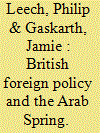

|
|
|
|
|
| Summary/Abstract |
The British government’s varied responses to the popular uprisings of the “Arab Spring” have been criticised for being inconsistent and/or selective. British actions ranged from providing substantial military support for the rebels in Libya to offering notably muted reactions to government suppression of protests in Bahrain. On assuming office, the new foreign secretary, William Hague, suggested that Britain would have a networked approach to foreign policy with a greater awareness of the bilateral interests that Britain had with other countries around the world. This analysis offers a provisional examination of the security, economic, and societal networks that Britain holds with states in the Arab world and, in doing so, tests whether these have any correlation with the British government’s policy towards protests in the region.
|
|
|
|
|
|
|
|
|
|
|
|
|
|
|
|
| 2 |
ID:
105398
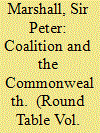

|
|
|
|
|
| Publication |
2011.
|
| Summary/Abstract |
The UK Coalition government, coming to power in May 2010, has already shown a more positive and purposeful approach to the Commonwealth than any of its predecessors. There is every reason for optimism that this will be maintained. This article gives an outline of the work and special character of the Commonwealth and looks forward to the report of the Eminent Persons' Group, the Perth Commonwealth Heads of Government Meeting and Her Majesty Queen Elizabeth's forthcoming Diamond Jubilee.
|
|
|
|
|
|
|
|
|
|
|
|
|
|
|
|
| 3 |
ID:
141730
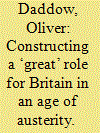

|
|
|
|
|
| Summary/Abstract |
This article interprets the ideational underpinnings of the British Conservative–Liberal coalition government’s foreign policy from 2010 to 2015. It uses qualitative discourse analysis of speeches, statements and policy documents to unpack the traditions of foreign policy thought which informed some of the key foreign policy practices of the coalition government. The analysis centres on the British identity constructed by liberal Conservatives, and the values and interests flowing from this baseline identity that the government’s foreign policy sought to express through its foreign policy. Liberal Conservative foreign policy is argued to have been an attempt to come to terms with the limits on Britain’s international agency in the face of three major foreign policy dilemmas: the legacy of the New Labour years, dramatically reduced economic resources in the ‘age of austerity’ and an increasingly restricted capacity for Britain to exercise ideational entrepreneurship in the international community. The article substantiates the claim in the extant literature that liberal Conservatism significantly adapted but did not restructure an established British foreign policy tradition of merging values and interests in complex ways.
|
|
|
|
|
|
|
|
|
|
|
|
|
|
|
|
| 4 |
ID:
097836
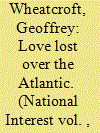

|
|
|
|
|
| Publication |
2010.
|
| Summary/Abstract |
IN MARCH 2001, the once youthful but now veteran Tory politician William Hague gave a speech at a Conservative Party conference in which he banged the anti-European drum. In March 2003, he gave another speech, in Parliament, in which he warmly endorsed Tony Blair's support for the American invasion of Iraq. In July 2010, he spoke once more, this time in the celebrated Locarno Room at the Foreign Office. But his tune had changed: like Prime Minister David Cameron, now-Foreign Secretary Hague has intimated that he seeks to distance Britain from reflexive support for Washington, and he says that, in a new multipolar world, he wants to move more generally from an obsession with the "blocs"-the United States, Europe and the Middle East-to forge fresh links with such emerging powerhouses as India, China and Brazil.
|
|
|
|
|
|
|
|
|
|
|
|
|
|
|
|
| 5 |
ID:
153433
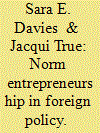

|
|
|
|
|
| Summary/Abstract |
Theories of international norm diffusion rely on accounts of entrepreneurial action almost exclusively identified as normative non-state actors who persuade powerful states to change their behaviour. We argue that powerful state agents can (also) be moral norm entrepreneurs and explicate the foreign policy acts that make them significant agents of international socialisation. Unlike non-state actors who set the agenda by advocating for new norms, foreign policy leaders leverage their identity and position to advance the recognition and diffusion of already established norms by reframing the moral prerogative of the ‘national interest’. The paper examines a prominent case, namely former British foreign secretary, Mr. William Hague's promotion, through the offices of the British Foreign Commonwealth, of the international norm prohibiting use of sexual violence in conflict. We ask why and how did the United Kingdom and William Hague devote the attention and resources of the foreign policy apparatus to further this norm established more than a decade earlier in the Rome Statute of the ICC and by gender justice advocates?
|
|
|
|
|
|
|
|
|
|
|
|
|
|
|
|
| 6 |
ID:
122472
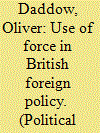

|
|
|
|
|
| Publication |
2013.
|
| Summary/Abstract |
This article studies the ideational underpinnings of the UK Coalition government's 'liberal conservative' foreign policy. It begins by suggesting that an Iraq-centric account of Blair's foreign policy suggests a grand vision on the prime minister's part that was lacking from his earlier foreign policy adventures, which relied on a more conventional form of British statecraft. The second section contends that the Gordon Brown years 2007-10 and, since the end of New Labour, Coalition foreign policy, can be seen as a response both to the substance and style of Blair's highly personalised stewardship of foreign policy post-9/11. The war on terror and the invasion of Iraq were accompanied by a seemingly open-ended democracy promotion around the globe which was quite out of character with past British practice. The article argues, therefore, that under Brown and Cameron cautious pragmatism has tended to win out over the proclamation of grand strategic ambition.
|
|
|
|
|
|
|
|
|
|
|
|
|
|
|
|
|
|
|
|
|